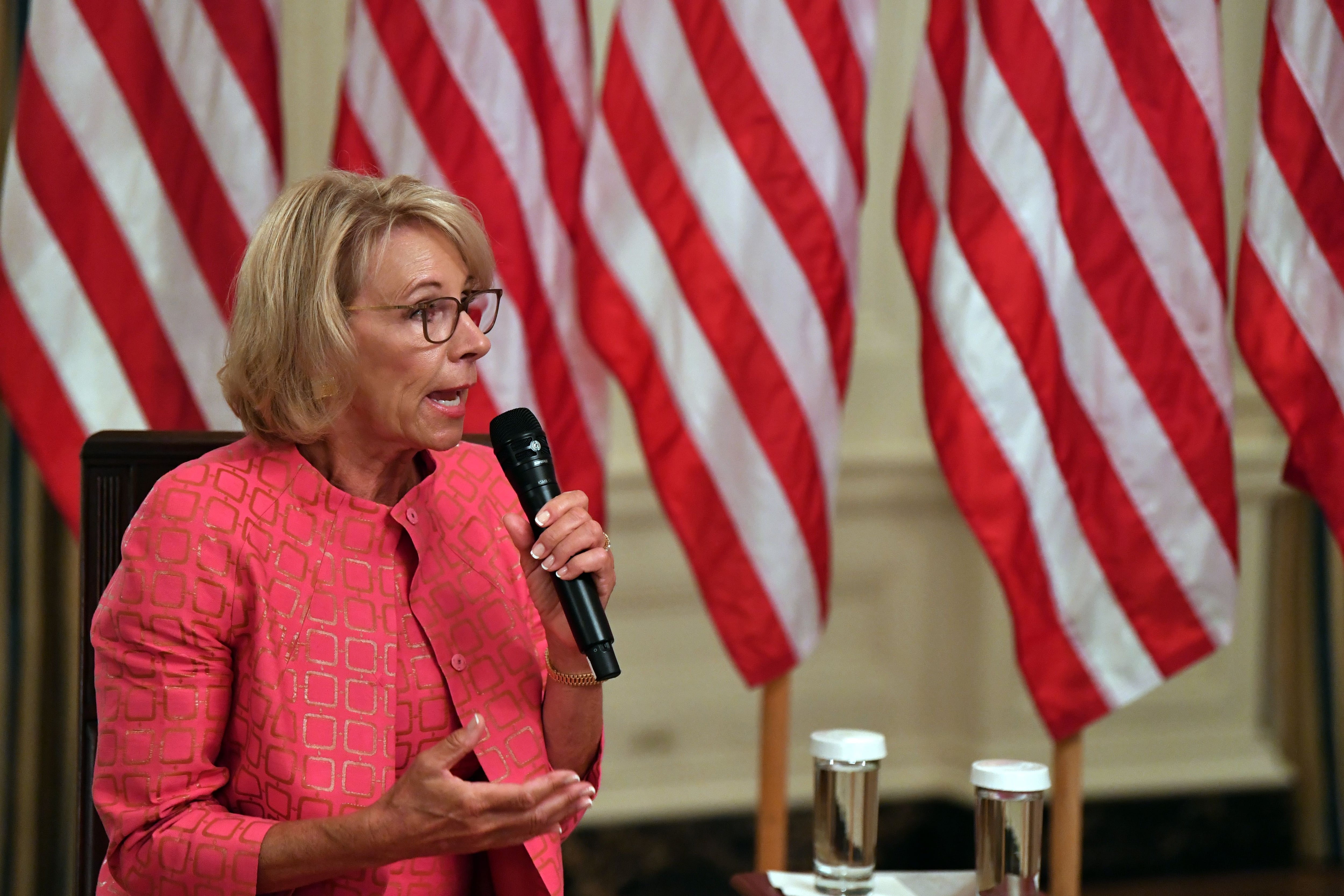Education Secretary Betsy DeVos’ controversial rule that would steer more coronavirus relief aid to private schools did not fare well in its first legal test.
A federal judge issued a preliminary injunction Friday that blocked it from being enforced in Washington state and potentially nationwide.
In a sharply worded order, U.S. District Judge Barbara Rothstein said the U.S. Department of Education’s rule went against Congress’ intent “under the guise of a manufactured ambiguity.” The result was a denial of needed resources to vulnerable students, she wrote.
“The funding provided throughout the CARES Act, and in particular to schools, is desperately and urgently needed to provide some measure of relief from the pandemic’s harms, many of which cannot be undone,” Rothstein wrote.
It was not immediately clear whether the ruling applies to the country as a whole or just to Washington state, which filed the lawsuit. A spokesperson for the Washington attorney general’s office, which argued the case, said it believes the injunction applies nationwide, but in a filing in a separate case, attorneys for the U.S. Department of Education say the order should only apply to Washington. The injunction itself does not specify.
Either way, the order may influence state and local decisions about how much money to set aside for private schools — and how other judges might rule in two similar lawsuits filed by multiple districts and states.
The decision, and its dismissal of the education department’s rationale, “are a bad sign for those arguments in the other upcoming cases,” said Julia Martin, an education lawyer who has advised states and districts on the issue and criticized DeVos’ approach.
At issue in the case is what share of the more than $13 billion that Congress allocated to K-12 schools under the CARES Act should help private schools.
The coronavirus relief legislation says some of that money is intended for private schools in the form of “equitable services” — traditionally, things like tutoring that districts provide to surrounding private schools and their students. The law says it should be distributed in the “same manner” as under ESEA, the federal education law, which says the money should be allocated based on the share of an area’s low-income students who attend private schools.
But DeVos’ education department issued guidance and a subsequent legally binding rule that said the money should be allocated based on the share of an area’s total students who attend private schools. Since private schools tend to serve fewer low-income students than nearby public schools, that interpretation effectively redirects resources from public schools to private ones.
(DeVos did give school districts an out, allowing them to use the smaller, low-income figure if they also limited how they spent money for public school students. But many district leaders also rejected this approach, saying it unnecessarily ties their hands.)
DeVos’ argument has been that the department’s interpretation is fairer to private schools and that the law itself is ambiguous.
“Our rule treats all students equally,” Angela Morabito, a department spokesperson, said in a statement responding to the injunction. “It’s unfortunate that so many favor discriminating against children who do not attend government-run schools.”
Rothstein, a federal judge for the Western District of Washington appointed by Jimmy Carter, rejected both arguments. “The statute could hardly be less ambiguous,” she wrote.
“Funding can be equitable even if it is not equal, which is certainly the case when Congress chooses to concentrate funding on those in the most need,” wrote Rothstein, who pointed out that private schools will receive aid under either approach.
Legal scholars consulted by Chalkbeat have generally agreed that DeVos’ approach does not align with a straightforward reading of the law.
The implications of the order were not immediately clear. The order states that DeVos and the department are “preliminarily enjoined from implementing or enforcing” the rule, without specifying whether this applies solely to Washington state or to the entire nation.
“We interpret Judge Rothstein’s ruling to apply nationwide based on the text of her ruling,” a spokesperson for the Washington attorney general’s office said.
Morabito did not respond to a question about how the Department of Education interpreted the ruling, but attorneys asserted in a filing in another case against the rule that the order “applies to the State of Washington only, the only plaintiff seeking relief in that case.”
Martin, the lawyer, said she understood the ruling only to apply to Washington. Her law firm is seeking clarification.
Derek Black, a law professor at the University of South Carolina who has been critical of DeVos’ rule, said he believes the ruling applies to the country as a whole, but said there is some disagreement over whether local judges have the authority to block nationwide rules.
“It will have enormous sway elsewhere no matter what,” he said. “Schools in other states will look to whatever law is available elsewhere if there is none in their state. So being first to the trough is crucial.”
Jessica Levin, an attorney with the Education Law Center, which is part of a separate lawsuit against DeVos’ rule, said districts need clear answers as soon as possible. “This is a big problem and a big headache for districts across the country,” she said. “They cannot afford to lose any more days in having clarity on how much money they have.”
She pointed out that the Washington injunction is preliminary and that her organization is seeking a nationwide final judgment before a federal judge in Washington, D.C. Oral arguments in that case will take place early next month, while arguments in a third suit, filed by several states, occurred last week.






